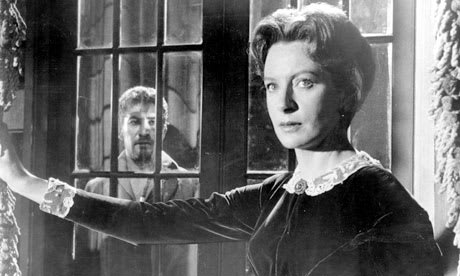In The Innocents, Jack Clayton's 1961 adaptation of Henry James' Turn of the Screw, some of the more ambiguous elements of the source text are exploited and modified to create a more thematically specific narrative.
Omitting the framing device of an omniscient narrator, the same set up exists with Miss Giddens (Deborah Kerr) traveling to a rural estate to be the governess for two orphans, Flora (Pamela Franklin) and Miles (Martin Stephens). Once there, she's pleased with the precocious and peppy demeanour of Flora and chooses to ignore the fact that Miles was recently expelled from school for corruptive behaviour.
Still, she struggles to sleep and notices peculiarity in the children's interactions, which is exacerbated by her tendency to see a male and female ghost wandering around the premises and popping up in windows.
Clayton's atmospheric approach to the material, creating an eerie tone through shadows, deep focus and minor peculiarities—candles blowing out and peripheral movements—culminating in eventual terrifying visual manifestations of otherworldly horror, gives it a dignified, timeless quality. It also helps draw a parallel between physical, objective reality and that of Miss Giddens' psychological state, making the nature of the antagonist unclear, superficially speaking.
What is clear is the nature of secrets and ghosts as representation of past repression. The misanthropic and manipulative disposition of the children suggests some sort of amplified abuse, which Clayton projects into sexual territory when a goodnight kiss between Miles and Miss Giddens lasts a little too long. Whether she's merely picking up on the psychological damage of molested children or having some sort of perverse psychological break herself—as a result of her own upbringing—is deliberately oblique.
Less oblique is the overall assertion that nurture shapes identity more than nature, just as the lack of a stable Judeo-Christian upbringing is vilified and perceived as the sort of social toxicity that creates evil. Being 1961, this sort of belief system isn't surprising, but the taboo paedophilic insinuations within The Innocents are.
In a way, Clayton's distressing and entirely engrossing gothic horror exists as an admonitory preaching the dangers of leaving children with strangers. Though understandably subdued, given the times, the extreme predatory nature and mental instability of false parental substitutes—save the subjugated, powerless maid, Mrs. Gross (Megs Jenkins)—is weirdly conventional and traditionalist for a story that seemingly tries to push the boundaries of good taste.
Though demonstrating a technical aptitude and progressive filmmaking style, helping propel the psychological horror genre forward, there are scare tactics being presented that transcend the mere terror of the ghostly apparitions on screen, which are almost as manipulative as the creepy children fake-smiling their way through the entire movie.
The Innocents screens at the TIFF Bell Lightbox at 7pm on February 11th, 2013 as part of the Books, Food and Science on film subscription series. Author and New Yorker theatre critic Hilton Als launches the Books on Film series with a focus on the classics, both on the page and onscreen, bringing a unique perspective to The Innocents.
(Fox)Omitting the framing device of an omniscient narrator, the same set up exists with Miss Giddens (Deborah Kerr) traveling to a rural estate to be the governess for two orphans, Flora (Pamela Franklin) and Miles (Martin Stephens). Once there, she's pleased with the precocious and peppy demeanour of Flora and chooses to ignore the fact that Miles was recently expelled from school for corruptive behaviour.
Still, she struggles to sleep and notices peculiarity in the children's interactions, which is exacerbated by her tendency to see a male and female ghost wandering around the premises and popping up in windows.
Clayton's atmospheric approach to the material, creating an eerie tone through shadows, deep focus and minor peculiarities—candles blowing out and peripheral movements—culminating in eventual terrifying visual manifestations of otherworldly horror, gives it a dignified, timeless quality. It also helps draw a parallel between physical, objective reality and that of Miss Giddens' psychological state, making the nature of the antagonist unclear, superficially speaking.
What is clear is the nature of secrets and ghosts as representation of past repression. The misanthropic and manipulative disposition of the children suggests some sort of amplified abuse, which Clayton projects into sexual territory when a goodnight kiss between Miles and Miss Giddens lasts a little too long. Whether she's merely picking up on the psychological damage of molested children or having some sort of perverse psychological break herself—as a result of her own upbringing—is deliberately oblique.
Less oblique is the overall assertion that nurture shapes identity more than nature, just as the lack of a stable Judeo-Christian upbringing is vilified and perceived as the sort of social toxicity that creates evil. Being 1961, this sort of belief system isn't surprising, but the taboo paedophilic insinuations within The Innocents are.
In a way, Clayton's distressing and entirely engrossing gothic horror exists as an admonitory preaching the dangers of leaving children with strangers. Though understandably subdued, given the times, the extreme predatory nature and mental instability of false parental substitutes—save the subjugated, powerless maid, Mrs. Gross (Megs Jenkins)—is weirdly conventional and traditionalist for a story that seemingly tries to push the boundaries of good taste.
Though demonstrating a technical aptitude and progressive filmmaking style, helping propel the psychological horror genre forward, there are scare tactics being presented that transcend the mere terror of the ghostly apparitions on screen, which are almost as manipulative as the creepy children fake-smiling their way through the entire movie.
The Innocents screens at the TIFF Bell Lightbox at 7pm on February 11th, 2013 as part of the Books, Food and Science on film subscription series. Author and New Yorker theatre critic Hilton Als launches the Books on Film series with a focus on the classics, both on the page and onscreen, bringing a unique perspective to The Innocents.
